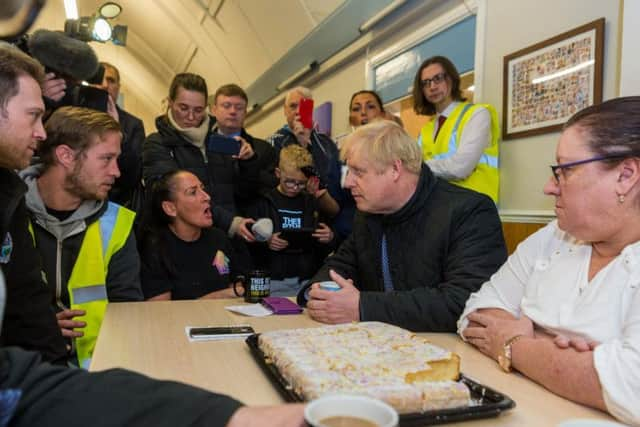How Yorkshire flooding and the Leeds General Infirmary saga helped throw the General Election off its script
And as Yorkshire - which voted strongly in favour of Brexit in 2017 - went to the polls today the defining political issue of the age will likely have been weighing heavily on the minds of many.
But in a campaign that saw the leaders of the main parties try and stick as tightly as possible to a pre-determined message, two of the key moments that saw the narrative drift away from the script both came in this region - and neither were to do with Brexit.
Advertisement
Hide AdAdvertisement
Hide AdIn early November, with the Prime Minister sticking to his 'get Brexit done' script and Labour rival Jeremy Corbyn trying to shift focus to the NHS and the future of public services, a deluge of rain described as 'biblical' by locals hit South Yorkshire and parts of the East Midlands.
A woman was swept to her death in Derbyshire, while hundreds of homes in villages like Stainforth and Fishlake were left underwater. The flooding was devastating for local communities, with many homes still uninhabitable a month later.
Mr Johnson and his team were left on the back foot in responding to the aftermath of the catastrophe, not helped by his insistence during his first visit to the affected area that the situation was not serious enough to be considered a "national emergency".


During a return visit a few days later, after Mr Corbyn and Liberal Democrat leader Jo Swinson showed their faces at the clean-up effort, he faced the wrath of locals, with one resident telling him his trip had come "too late" and another adding: "I don't know what you're here today for."
Advertisement
Hide AdAdvertisement
Hide AdSince then the Government has stepped up its efforts to aid the flood-hit areas, many of which fit the description of the exact kind of constituencies the Conservatives are trying to win - seats with an incumbent Labour MP which voted Leave in 2016.
And the views of voters in these areas came under the spotlight as the campaign wore on, not least in the televised debates where the main parties went head-to-head.
A Question Time Leaders Special, where Jeremy Corbyn promised to stay neutral on Brexit in any future referendum, was held in Sheffield, and there were less high-profile TV debates in York and Leeds.
Question Time was held in Hull - with Labour's Anneliese Dodds drafted in at the last minute to avoid having an all-male panel - and Newsnight came to the marginal seat of Wakefield to take the temperature.
Advertisement
Hide AdAdvertisement
Hide AdWhen The Yorkshire Post spoke to these voters, it was apparent that many were unimpressed with the choices in front of them. Though a significant number of traditional Labour voters were put off by the leadership of Jeremy Corbyn and considered voting Tory for the first time ever, the lack of trust in Boris Johnson as a person was evident.
One voter in Tory-held York Outer summed it up as she said: "I feel very despondent about the whole thing. I have always voted Conservative but this time I can't bring myself to vote for Boris, I definitely don't want Jeremy and third option you don't get anywhere with."
This lack of enthusiasm for the two main parties did not appear to translate into support for other options. Support for the Liberal Democrats seemed to wane, with the party's poll ratings falling from above 20 per cent in October to 13 per cent on polling day.
And despite Nigel Farage's persistent targeting of Labour-held seats - he was a regular visitor to Hull, Doncaster and Barnsley - the Brexit Party's numbers suffered a similar fate as the weeks wore on.
Advertisement
Hide AdAdvertisement
Hide AdLabour's clear intent throughout was to wrestle the debate away from Brexit and onto their favoured ground of the NHS. A visit by US President Donald Trump to London failed the provide the mishap they were hoping for, despite his previous claims that the NHS would be 'on the table' in future trade deals.
But an NHS story with its origins in Leeds dramatically shifted the narrative in the final days. The ordeal of a four-year-old boy forced to sleep on the floor of the Leeds General Infirmary due to a lack of beds was revealed by the Yorkshire Evening Post and quickly rose to the top of the political agenda as it was seized upon by Labour.
Health Secretary Matt Hancock dashed to the hospital for talks with bosses, while Mr Johnson was confronted with the image of the boy during a photo-op in Grimsby.
All of which meant that in the final polls before votes were cast, the likely outcome was unclear. Some polling suggested a small Tory majority, while others appeared to indicate a hung Parliament.
Advertisement
Hide AdAdvertisement
Hide AdWith so many voters apparently undecided, all that could be said with any certainty was that nothing was certain. Or as Boris Johnson put it as he delivered milk in the marginal seat of Pudsey in the early hours of Tuesday: "It could not be tighter."
